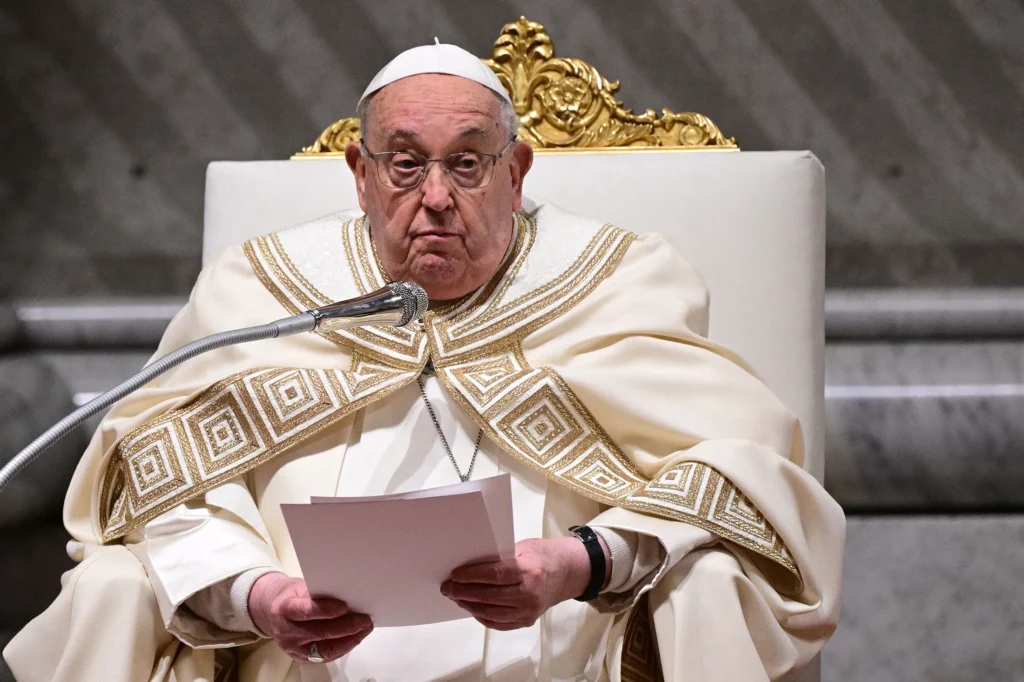Pope Francis, born Jorge Mario Bergoglio in Buenos Aires, Argentina, and known worldwide as the first Latin American pope, has died at age 88. His death on April 14, 2025, marked the end of a 12-year papacy defined by humility, social justice, and groundbreaking reforms. He passed away at the Vatican following complications from double pneumonia, a condition worsened by chronic lung issues that had followed him since youth.

His passing was formally announced by Cardinal Kevin Farrell from the chapel of Domus Santa Marta, Francis’ humble residence within Vatican City. Bells rang solemnly across Rome, honoring a man who reshaped the image of the Catholic Church.
From the moment he greeted the world with a simple “Buonasera” after being elected on March 13, 2013, Pope Francis made it clear his leadership would diverge from tradition. Rejecting the grandeur associated with the papacy, he chose modest dress, simple living quarters, and direct engagement with society’s most marginalized.
He was elected to bring reform to the Vatican bureaucracy and finances following scandals that marred the final years of Pope Benedict XVI. But Francis quickly expanded that mission to address deeper societal and theological issues.
Francis’ commitment to social justice became a hallmark of his papacy. He called for a Church “of the poor and for the poor,” often visiting impoverished communities, refugee camps, and war-torn regions. He emphasized inclusivity, famously saying, “Who am I to judge?” when asked about LGBTQ+ Catholics—signaling a more compassionate stance.
He decried economic inequality, climate inaction, and exclusionary nationalism. His critiques of capitalism and global markets earned praise from progressives and condemnation from conservatives, who labeled him a “Marxist” or worse.
Francis’ global influence was tested during the COVID-19 pandemic. Alone in a rain-soaked St. Peter’s Square in March 2020, he offered a powerful message of shared vulnerability: “We are all in the same boat.” He used the moment to challenge world leaders to rethink global inequality and environmental degradation.
His pastoral style remained personal and present. Despite his declining health, he appeared publicly for Easter Mass 2025—just one day before his death—blessing crowds in St. Peter’s Square with a final popemobile ride that drew roaring applause.
Francis undertook institutional reforms, including financial transparency measures, restructuring the Vatican bank, and curbing internal corruption. He approved a landmark—though secretive—accord with China on bishop appointments and engaged in dialogue with the Muslim world.
Though he upheld the Church’s traditional stance on abortion and male-only priesthood, he gave women more prominent roles within the Vatican, including voting rights at synods. Sister Nathalie Becquart, the first woman to vote in a synod, called his vision “a shift from domination to cooperation.”
Despite these advances, groups like the Women’s Ordination Conference criticized his refusal to ordain women, calling it a painful contradiction to his otherwise inclusive approach.
One of the darkest episodes of his papacy was his mishandling of a clerical sexual abuse case in Chile. Initially dismissive of survivors’ testimonies, Francis later admitted his mistake, invited victims to the Vatican, and demanded mass resignations from Chilean bishops.
He created a sex abuse commission and later rewrote Church law to ensure greater accountability. Still, critics argued he didn’t go far enough, especially in prosecuting complicit bishops. Yet survivors like Juan Carlos Cruz eventually formed close bonds with him, affirming his sincere commitment to change.
Francis’ openness to same-sex blessings, easing of annulment procedures, and call for pastoral flexibility on divorce stirred backlash from conservative factions within the Church. Cardinals, including U.S. Cardinal Raymond Burke, openly challenged his decisions, branding him divisive and even heretical.
Francis responded with silence and reforms. He stripped Burke of Vatican privileges, insisting that Church leaders must carry the “odor of their flock” rather than cling to power or tradition.
Choosing the name Francis in honor of St. Francis of Assisi, the pope modeled his life on simplicity, compassion, and environmental stewardship. He wore orthotic shoes, lived in a modest Vatican guesthouse, and used compact vehicles instead of luxury cars.
He embraced lepers, prisoners, and the disabled. He kissed the tattoo of a Holocaust survivor and invited waste pickers from Buenos Aires to stand with him on stage in Rio. To Francis, every life held divine value.
Francis prioritized visits to the fringes—Lampedusa, the Arabian Peninsula, Iraq—rather than the power centers of global Catholicism. He apologized to Indigenous peoples for colonial crimes and emphasized reconciliation and justice.
His focus on the Beatitudes grounded his theology in mercy, humility, and service to the least among us. “The church is a field hospital after battle,” he often said, underscoring his mission to heal rather than judge.
Even as age and illness overtook him, Francis remained a powerful spiritual figure. His final public moments, blessing crowds in St. Peter’s Square and meeting briefly with U.S. Vice President JD Vance, encapsulated his enduring pastoral energy.
With his death, a new papal conclave will be convened. But his legacy is already assured: Pope Francis was a revolutionary leader who opened the doors of the Catholic Church wider than ever before, even as he faced resistance from within.He leaves behind a global community forever changed by his courage, simplicity, and unwavering belief in a Church for todos, todos, todos—everyone.



